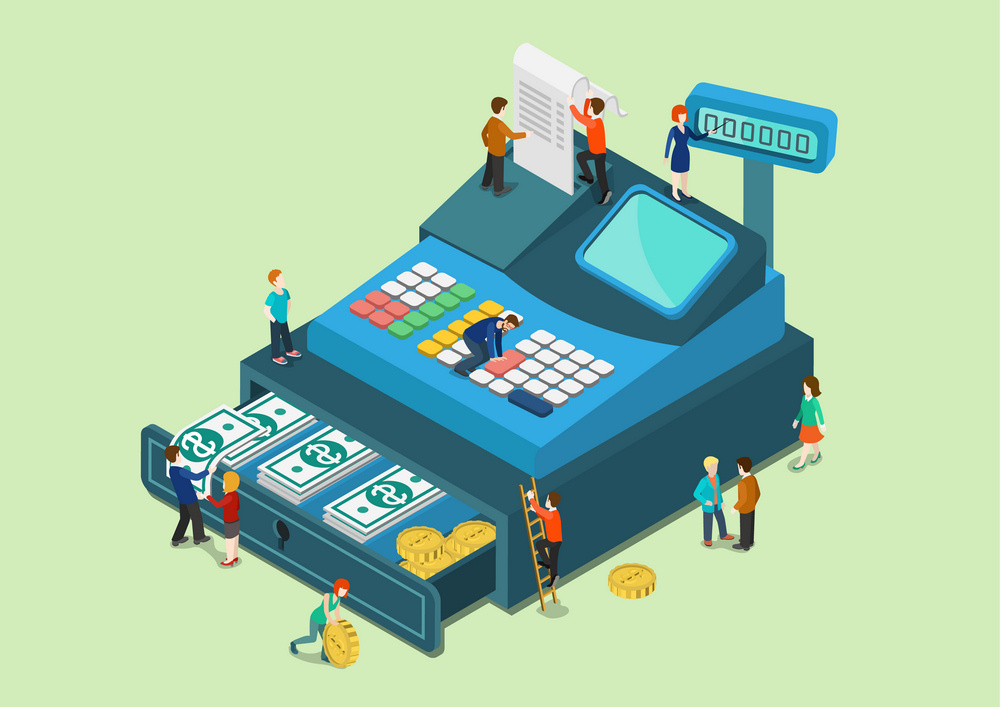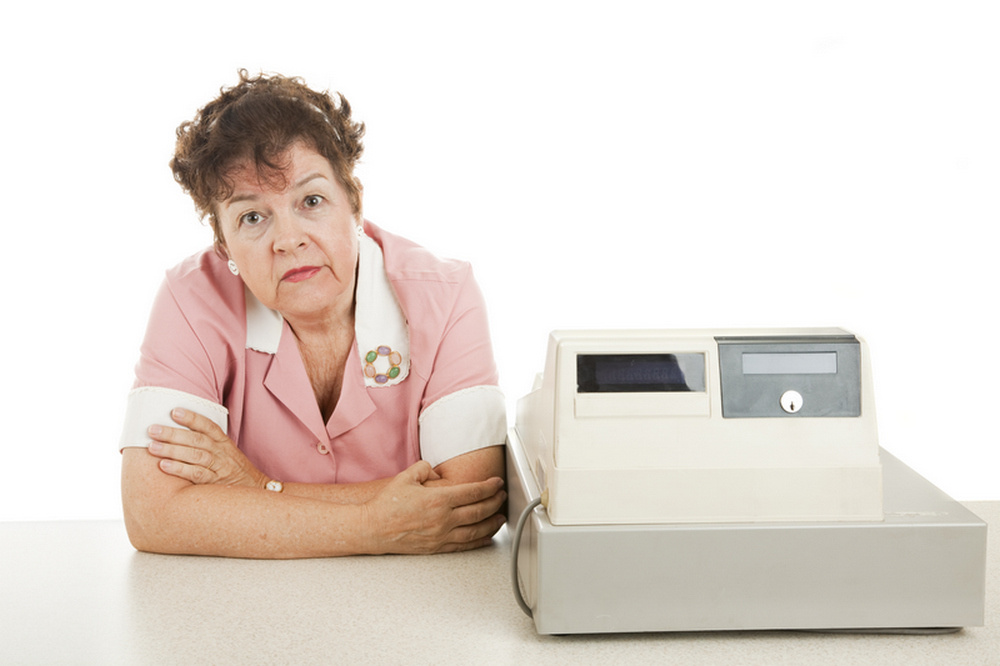How we transferred 400 stores to electronic cash desks

Hi, my name is Svetlana, I’m a leading analyst in the retail of M.Video. If you had to introduce electronic cash registers in offline business, then you perfectly imagine the non-trivial nature of the task. And if there are several hundred stores across the country, the project turns into a task with many unknowns. And today I want to talk about our experience in introducing electronic cash registers, moreover, from the point of view of the analyst and project manager. And my colleagues will describe the technical details in one of the next publications.
So, in November 2016, we learned that the introduction of FZ-54 is coming: by the summer of 2017 we will have to change all the cash desks in our stores for new ones. All cash desks are about 2.5 thousand in all regions of the country: from Vladivostok to Kaliningrad. Do you know how I was assigned the task?
“Changes have appeared in the Russian Federation: federal law 54 - cloud fiscalization! We must comply. " And we started to implement the directive.
Input data
At the end of October 2016, we knew that Rosneft had already introduced new cash registers, and the tax even was pleased with the result. But how it happened, in what form it was introduced - no one knew the details. Googling, we realized that no one on the market yet really knows what to do. They didn’t know much: there is a new format of fiscal data, a document of 100 pages, which contains tags that must be transferred to the OFD and tax. There are fiscal data operators - certified organizations, we will have to conclude an agreement with at least one of them, which means: a tender, long agony of choice, and before that there is no test site. And the procedure for registering and re-registering cash desks is changing: now you don’t have to carry the CCP to the tax office, you can do everything remotely through the taxpayer’s personal account. The rest of the information was inconsistent and vague.
There was no doubt only one thing: we would definitely have to do this, as well as modernize the cash register fleet, since instead of EKLZ (protected electronic control tape) a fiscal drive appears.
Transition to new cash desks
An urgent project team was created consisting of managers, analysts and several technical specialists who were engaged in the selection of cash registers.
There were two options:
- buy new certified cash desks (and there were not many companies that already certified KKT at that time);
- make custom cash desks: remove the EKLZ from the old ones, drill a couple of holes, insert a couple of wires and connect a fiscal drive.
As a result, we decided not to fence the collective farm with the alteration of cash desks, but to purchase new ones. We chose the Atol company, which became for us a cash register supplier and a new partner.
How was the implementation
Strategically, the team decided that we would delay the implementation of FZ-54 to the last, but skip the implementation phase on version FFD 1.0, re-register from 1.0 to 1.05, and start immediately on version 1.05. As life has shown, the decision was erroneous and cost us almost a month for wasted time.
At first there was chaos: the format of fiscal data that needs to be transferred to the tax system changed every two days. We were developing something, the legislative requirements were updated, and we began to refine what we did yesterday. And so several times.

The second difficulty was that our software was written in Oracle, and Atol at that time did not yet have compatible firmware. Therefore, I also had to write in parallel a shell for CCP, which provided interaction between the cash registers and our software. This work was the most difficult, because it was actually performed by touch, by trial and error. In fact, they invented a bicycle.
As a result, a separate service was developed, which is installed at each cashier's workplace and interacts with the CCP, receiving and transmitting data.
A lot of time and effort was spent in trying to match our many forms of payment and cards with discounts, advances, bonus and virtual rubles with various tags: credit, advance, prepayment, credit of the advance. The puzzle did not fit, how much we did not consult with financiers and methodologists.
A separate wish of the company was to preserve the appearance of the cash receipt, in which for each product additional characteristics and a breakdown of the discount provided in terms of applied shares and discount funds are indicated. And this completely excluded the option of using a check template from CCP. We undertook to develop a new template in which we combined the requirements of the company and the law. The interests of both parties were met, but the check became twice as long, and the consumption of the cash register subsequently increased significantly.
Gift Card Issues
Another of the bicycles was gift cards. How to transfer data on them to the tax? When a customer purchases a gift card, we deposit money on it - an advance payment - which is then spent on the purchase of goods - offset advance payment. That is, the turnover of one amount of money is carried out twice, and according to the new law “every check must be fiscalized”, in this situation we had to pay tax twice: the first time - when we sold the card with the charge on it, the second time - when we got this card use as payment. However, FFD 1.0 did not provide a breakdown into loans, advances, repayment of advances and other payments.
This was provided for in later versions of the FFD, starting from 1.05. That is why we chose it at the start of the project, but ... the format was not coordinated with the tax, there were no explanations for using the format, and therefore KKT firmware was not ready to support 1.05 even in the test loop.
Time passed, but did not become clearer. The approval date for FFD 1.05 was persistently shifting, and the deadlines were tight. A new round of coordination began with financiers, the cash group, and methodologists. It was decided to show the amount of payment with gift cards as a discount on the purchase. But as soon as the revision was completed and the presentation was made, the tax clarification came that it was absolutely impossible to do this. And having sighed heavily, the team came together on the weekend and once again swapped the wheels of the bicycle.
Additions to the law and confrontation with tax
As I said, as soon as we solved a problem, explanations of the law appeared. I had to redo constantly. But initially, we were faced with the fact that lawmakers and tax officials simply did not have answers to the many questions that arose for business. As a result, the Akit working group emerged, which brought together the producers of KKT, business and tax specialists.
At each meeting, the tax authorities told how it should be from their point of view, then were puzzled by our questions, understood that the business processes were a bit wider than they had imagined based on the experience of Rosneft, and took a pause for reflection. And when they came back with answers and other companies started asking clarifying questions, everyone understood that we were at a standstill again, new questions arose, and the tax office again left to think. The process was painful, and this tyagomotin lasted from November to March.
And in March, we lost our patience when we learned that we would soon begin to “lose” stores if we did not start the project in the near future, and began to implement them based on the criteria that were at that time.
Checks in the online store
In parallel, the second group was working on the introduction of FZ-54 in online stores. If earlier checks for online purchases made their way only if the goods were delivered by a courier with a mobile cash register, then according to the new law it was required to transfer a check to the OFD, tax and to the client for each purchase when paying with a card on the site, Yandex.Money and other types of electronic payments.
Previously, in these cases there was no check as such. The purchase was displayed on the accounts of the company and went through the tax base, but this was only visible at the level of our accounting department, which independently reconciled the calculations with the tax one. And therefore, we did not have any cash desks for online stores. It was necessary to cycle again.
In the end, we decided to install the exact same cash desks for online stores as in retail. And in order for cash desks to physically manage to process all orders, check print modules were removed from them, since one check is printed for 5-7 seconds. Then we decided to use the Atol company solution: the so-called farms for parallelizing the cash desk and balancing the load. Today, Atol has a complete turnkey solution for online stores, but we proceeded from what was on the market at that time.
Better sooner than never
We did the right thing by running in parallel all the work on the introduction of electronic cash registers: some together with the manufacturers of CCP thought out how to switch all stores to the new format, while others in December were engaged in the purchase of new cash registers and fiscal drives. Many other companies attended to the purchase later and simply did not manage to get new cash by the time the law came into force, because the manufacturers did not have time to physically satisfy the demand that had arisen at once.
There were two very important dates in our difficult quest:
- February 1, 2017 - starting from this day, it was forbidden to register cash registers of the old standard.
- July 1, 2017 - on this fateful day, all cash desks were supposed to work on new software.
The period from February 1 to July 1 was very stressful. Firstly, we did not have software for new cash desks yet. However, the box office too. And after February 1, it was already planned to open several stores.
Until February 1, we tried to read: we bought cash desks from ECLZ and tried to register them in advance, before the stores opened. But to do this without the address of the store and the lease of the premises was impossible. Therefore, we either asked to move the opening date closer to July 1, or came up with some tricks. For example, in some stores cash registers were registered in advance at the address of a nearby store, realizing that we would then be fined, but at least they were registered cash registers where you can open a store. And paying a penalty for address mismatch was much easier than not opening the store on time or trading with non-certified cash registers.
Add here such a factor that from February 1 to July 1 at some cash desks of four hundred stores the ECLZ validity period was coming to an end. All stores had to be conducted through an inventory, to identify at each checkout the expiration date of the EKLZ, and, if possible, replace them before the law comes into force.
Before the New Year, the replacement process went with a bang, we painlessly replaced the EKLZ in some of the ticket offices with new ones. Many other companies did the same. Although it was legal, the tax office quickly realized what was happening, and covered this shop. Now, it was possible to change the EKDZ or the cash desk itself only for a serious reason: if the cash desk was broken or the EKLZ deadline came to an end.
Then letters from the financial directorate to the tax authorities in the regions, private contracts with the central heating service were used, in especially severe cases they even thought about resorting to cash-wrecking: in stores, “accidentally” drop something heavy or spill hot tea on the machines.
The deadlines were running out, we did not have time to finish the cash register software. We understood that from the middle of April in a number of stores some of the cash desks will be decommissioned, but there is no replacement fund. It would seem that this is terrible: in the store there are four cash desks, one has been removed, three are left, you can work. But at one far from perfect moment in one of the large stores with 12 cash desks, the 8. failed. The remaining four were categorically not enough for timely customer service. X hour from July 1 shifted to April.
And it soon became clear that in March the three stores would rise completely, if not to replace cash registers and introduce new requirements of FZ-54 in these stores.

Avral and his team
And we switched to the 24 x 7 mode of operation. All new cash desks coming from suppliers were sent first to distant regions of the country, and Moscow stores were put at the end of the line. At the same time, it was necessary to solve the problem of remote registration of cash registers, because it was no longer possible to do this centrally, since part of the cash desks were in full swing to the regions. It only remained to give the initiative to the directors of the stores so that they independently took care of registration. But for this, each director had to give a cryptographic key, because registering a cash register is a serious matter, it’s not for you to create an account in the messenger.
In addition, it turned out that the cash desks that had already been sent to the regions had old firmware - after all, the purchase contract was concluded on-h-th when, and since then a lot of water and firmware has leaked. And for registration all devices now need to be reflashed.
I had to create a team of technical support heroes who, in the feat mode, traveled to branches and reflashed the cash registers that had just arrived. In order not to occupy operating cash desks, registration was performed at the workplace of the senior cashier. To do this, it was necessary to quickly convert it, reconfigure the ports, install the necessary software. Registered devices were lined up in a row, connected to the network and registered. It happened that there were not enough cables, and they had to be taken directly from the windows.
People and time were sorely lacking, we practically paralyzed the technical support of the stores, while the engineers and I debugged the process of flashing and registering. On the go, instructions, schedules for the arrival of specialists and the transition of stores to new cash desks were compiled and changed. The employees themselves managed the last procedure in some branches, while in others the employees categorically refused to dive under the tables, pull out wires, remove old cash desks, and install and connect new ones.
Cleaning lady in the server room
The crisis has receded, shops are provided with new cash desks, checks are breaking through. And suddenly it turned out that at some points, information about checks is not sent to the tax. We began to understand the places. In one store, someone walked, tripped over a network cable, and it flew out of the connector. In another store, the network equipment is not configured, in the third there is simply an unstable network connection, in the fourth there is something else. But as a result, checks have not been sent for a couple of days. Of course, all the information is stored on the fiscal drive, and as soon as the connection appears, everything will go to the fiscal data operator in bulk.
But if the cash desk does not transfer anything to the tax for 30 days, then it is automatically blocked for sales.
When there were few stores that switched to new cash desks, the whole team looked after them like babies in a manger, and it was possible to manually manually track open cash register shifts daily. And when the number of ticket offices is estimated at many hundreds, you can’t keep track of everyone. I had to urgently modify the software: if at the end of the day the data is not sent to the fiscal operator, our cashiers will receive a notification so that they contact technical support.
From that moment, technical support began to “love” us even more.

What have come and where are we striving
Now we have all the stores transferred to new cash registers. For the time being, we only work with Atolls, although this categorically contradicts our anti-monopoly policy. The removed “Strokes” were inventoried: those who are over 5 years old were disposed of, while the more recent ones were tested and prepared for modernization. We will write software for them, call the specialists of the central heating service, they will insert fiscal drives and seal it, this will be a reserve fund. We have already learned from bitter experience when our previous supplier simply did not begin to talk with us about the supply of new cash registers at the end of last year, although a supply contract was still in force. In addition, cash registers can break down (themselves, honestly!), They have to be repaired or replaced.
The current version of the fiscal data format 1.0 is valid until January 1, 2019, so soon we will begin work on the transition to version 1.05. There are more tags in it, in particular, there is a description of the commissioned product, the concept of separation of payment forms, and much more that we need so much. This will allow using more filters in tax reports.
Today we have only two forms of payment: cash and electronic means of payment. The second category includes advances, loans, bank cards, Yandex.Money, Qiwi wallets and more. Therefore, to understand at the level of the fiscal data operator that there is something is simply mission impossible. And this makes it difficult to offset the tax.
According to the law, if a client wants to receive a check in electronic form, then we are obliged to send either an SMS or an email with the key parameters of this check. Everything is simple with mail, we can send a very beautiful picture of the check, and it looks like a real paper check. But the same SMS is a very expensive pleasure. If you send too much information, you will have to pay not for one message, but for several, so we decided to send only 5 fiscal signs that uniquely identify the check. Also, these signs are sewn into a QR code, which is printed on the check.

So, if you wish, any person can immediately get all the information on the check by scanning the code or driving 5 fiscal signs of the check manually in the mobile application of the tax service "Check checks". By the way, the scheme works so far is not perfect.
We have not yet implemented sending SMS on our own, because the introduction of this feature requires a large amount of work to create a sending service at the box office, implementing monitoring for timely sending, and forcing re-sending in case of failure.
But all this is ahead of us.
And now, turning back, I see that even in such a task - with many unknowns, with sharply shifting deadlines, with changing equipment and partners on the go, you can observe the quality and deadlines, perform a quick and competent implementation. There are no unsolvable problems if people are ready to work and go towards their goal! I am proud of the result of our work! This experience is invaluable to all participants.
